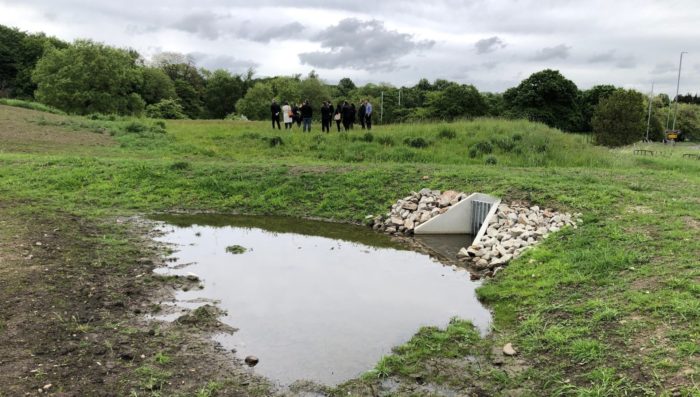Bodington Fields Natural Flood Management Site Completed
- Tags
- Bodington Fields
The official launch of a natural flood management site on Bodington Fields took place on 19th May.
Located at the Brownlee Triathlon Centre in north Leeds, the site is the first of its kind in the UK. It will reduce flood risk in the area and increase resilience to the impacts of climate change.
Councillor Hayden, Executive Member for Infrastructure and Climate at Leeds City Council, attended the official launch event alongside colleagues from the Environment Agency and the University of Leeds.
Some of the measures installed at Bodington Fields include leaky dam barriers, a balancing pond and wetland areas which help slow the flow of water to increase flood resilience. The site is a ‘living lab’, providing research and teaching opportunities for University of Leeds students and staff, and contributing to the understanding of flood management at a national level.
The planting of 5,000 trees and wildflower areas helps reduce flood risk as well as offering wider biodiversity and climate benefits. Studies are being carried out on optimal tree densities and how to improve the survival of young trees as they develop into mature woodland.

James Wright from the University of Leeds Estates and Facilities team, who supported on the construction and planting phases, said:
As well as helping to reduce flood risk, this fantastic new development provides a ‘living lab’ for research and teaching at the University of Leeds and contributes to the understanding of flood management at a national level.
Michael Howroyd, Sustainability Projects Officer within the Sustainability Service at the University of Leeds, added:
The project is a fantastic example of how collaboration across stakeholders can make use of University land for world class research and teaching, which will have an impact across the wider city region and beyond.
Reducing the risk and impact of flooding is an important aspect of building resilience to the effects of climate change. Climate resilience is an important aspect of the University’s Climate Plan and pathway to delivering net zero emissions by 2030.
The project has been delivered through collaboration between the University of Leeds, the Environment Agency, and Leeds City Council. It is the second phase of the Leeds Flood Alleviation Scheme which aims to better protect 1,048 homes and 474 businesses from flooding along the River Aire.
Colleagues from the University of Leeds Sustainability Service, Estates & Facilities and Sport & Physical Activity all supported on the project.
To find out more about Bodington Fields, click on this link. If you are interested in using the site for your own reseach, email sustainability@leeds.ac.uk. Find out more about the biodiversity monitoring programme on site by emailing biodiversity@leeds.ac.uk.
Keep up to date on the latest news
-
-
- Follow us on Twitter: @UoL_Sus
- Follow us on Instagram: @uol_sus
- Follow us on Facebook: @UoLSustainability
- Sign up to our Sustainability newsletter
-
 We use the United Nations Sustainable Development Goals (SDGs) as a framework to guide our activity.
We use the United Nations Sustainable Development Goals (SDGs) as a framework to guide our activity.
Find out more about our impact on the SDGs.
